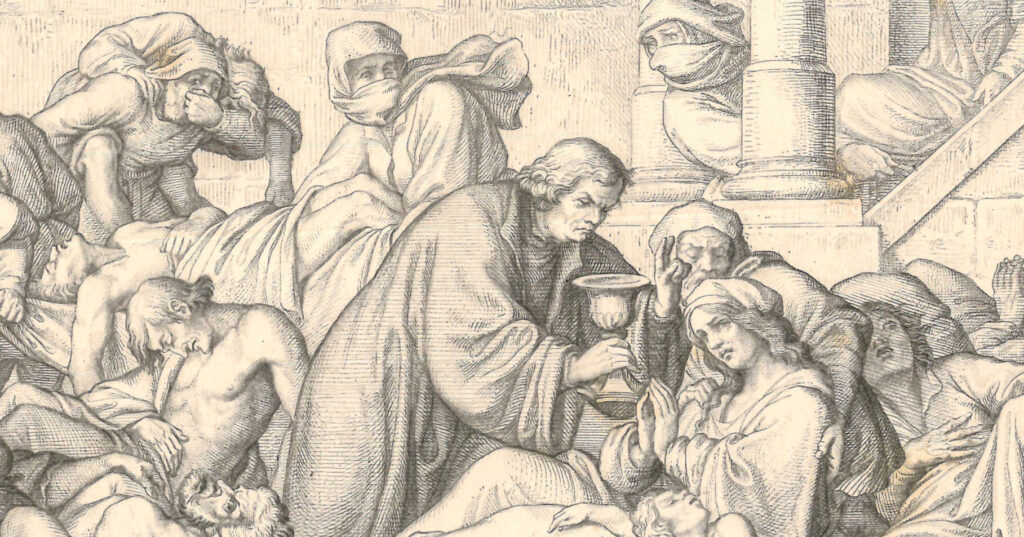by Matthew C. Harrison
Martin Luther loved to use the example of a “sack” to preach the Gospel. On Luke 17:32, “Fear not, little flock, for it is your Father’s good pleasure to give you the kingdom,” he preached. “‘He wills to give you the kingdom,’ He says, ‘so don’t look to your own merit.’ Only hold open the sack and take what He gives and gives very happily to you” (WA 32.87).
In Matthew 9:2, Jesus heals a paralytic: “And behold, some people brought to him a paralytic, lying on a bed. And when Jesus saw their faith, he said to the paralytic, ‘Take heart, my son; your sins are forgiven.’” Luther commented: “These are words that have to do with the Gospel. Thus, it is not Moses, the policeman or legislator who is spoken of, nor is anything imposed upon the paralytic to do, nor any law. He receives only consolation. Jesus desires only to give to him and would merely have him hold the sack and let it be done” (WA 34.330).
On John 3:16, “For God so loved the world, that he gave his only Son, that whoever believes in him should not perish,” Luther again preached: “Now in what way do I take what’s offered? What’s the bag in which the treasure is placed? Faith! Namely that which believes and holds the hands and the sack open. You can’t merit it by a monastic life. Your works don’t belong here. Only see that you let it be given you. Just hold your mouth open and do nothing. Just hold still and let me shovel it in” (WA 37.413).
Faith is the “sack” that receives and holds the gift. The gift of forgiveness and life and salvation given can’t but move the recipient to give in return. The most important gift the Christian gives is love to his neighbor. “God doesn’t need your works,” Luther fumed about the wrong trajectory of worship in medieval Catholicism. It was all wrong because it was all about doing things to earn merit, earning points with God for a shorter time in purgatory. “God doesn’t need your works. Your neighbor does.” The Reformation changed the trajectory of the church worship dramatically from Law to Gospel.
Our services today open with the pastor making the sign of the cross, recalling your Baptism, and saying, “In the name of the Father and of the Son and of the Holy Spirit.” It’s Gospel. Where God’s name is, there is life and salvation. That name is on you since your Baptism. Faith is the sack that receives the gift and faith says: “Amen. Yes. Truth. It shall be so!”
In the confession of sins, we acknowledge our depravity in thought, word and deed. “Dear God, I’ve got an empty sack!” And “in the stead and by the command of our Lord Jesus Christ,” the pastor says in the place of Jesus Himself and His words (John 20), “I forgive you all your sins in the name of the Father and of the Son and of the Holy Spirit.” In the sack it goes. Amen. I believe it. It’s in the bag.
The lessons from the lectionary provide the fulsome teaching of the whole Bible so the pastor isn’t just gassing on about his pet topics. We hear Law (condemning our sins) and Gospel (forgiving our sins). And this condemnation and forgiveness actually happen as the Word of God hits us, “living and active, sharper than any two-edged sword” (Heb. 4:12). The gift of forgiveness happens in church, and wherever the Word strikes.
The pastor proclaims God’s Law and Gospel as he delivers the Word of God based upon the texts. Make no mistake, for the New Testament as for Luther and Lutherans, the sermon is not mere information for a person to contemplate or decide upon. It’s the Gospel, the “power of God for salvation” (Rom. 1:16). A sermon that does not clearly proclaim, “Your sins are forgiven for the sake of the life, death, and resurrection of Jesus,” is not Lutheran. In fact, it’s not Christian. Pastors exist to deliver the goods right into the sack of faith.
We hear the Words of Institution for the Supper: “This is my body given for you.” “This is my blood, shed for you for the forgiveness of sins.” Then, in a way that only intensifies the certainty of the gift of forgiveness, the body and blood of Jesus are placed in your mouth for forgiveness. And you say, “Amen. Got it in the bag!”
All the way through the service, the Word of God in the liturgy and in the hymns strikes and does what it says, now cajoling, then condemning, then forgiving, now consoling. It continues all the way to the end of the service when you hear the blessed Gospel-laden words of the one Triune God: “The Lord bless you and keep you. The Lord make His face to shine upon you and be gracious unto you. The Lord lift up His countenance upon you and give you peace.” “For [Jesus] himself is our peace, who has made us both one and has broken down in his flesh the dividing wall of hostility” (Eph. 2:14).
And we say: “Amen, Amen, Amen to that. It’s in the bag. Gift received, now ready to be doled out to my spouse, my children, my neighbors, my coworkers, the needy.”
Once a Christian recognizes the Gospel and the Gospel delivered, he or she will never look at church the same way again.
–Pastor Harrison




